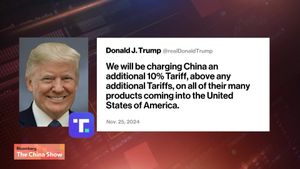The U.S. Agency for International Development (USAID) has been thrown under the spotlight as its Washington, D.C. headquarters faced closure announced just hours after President Donald Trump reportedly agreed to shut it down, following input from tech mogul Elon Musk. The shutdown, described by Musk, who leads Trump’s Department of Government Efficiency, poses serious questions about the future of the agency and the fate of its 10,000 employees, most of whom are engaged overseas.
Staff at USAID received emails on February 3, 2025, directing them to work from home as their headquarters, located at the Ronald Reagan Building, was closed for the day. This abrupt change followed the recent suspension of two senior security officials at USAID after they attempted to block access to agency systems by Musk's DOGE team. One USAID employee expressed the underlying tension, stating, “No one feels safe to go anywhere near the Ronald Reagan building.”
According to sources familiar with the developments, the Trump administration is considering folding USAID’s functions under the State Department, thereby significantly altering its operations.
“With regard to the USAID stuff, I went over [it] with him in detail, and he agreed to shut it down,” Musk stated, confidently asserting Trump's backing for the move. This approach risks throwing billions of dollars in U.S. foreign aid programs off balance, particularly as international humanitarian projects face uncertainty amid the administration’s staffing and funding cuts.
Established by President John F. Kennedy under the Foreign Assistance Act of 1961, USAID has been the leading arm of America’s foreign aid strategy, helping to alleviate poverty and advance economic development in nearly 130 countries globally. Recent reports indicate the agency provided substantial support to Ukraine during the current conflict and has engaged extensively worldwide to tackle humanitarian crises. "USAID has provided significant humanitarian, development, and economic support to Ukraine and countries affected by Russia’s war," noted reports from the Congressional Research Service.
Discontent within USAID has been intensifying. Over the past weeks, the agency has seen numerous layoffs. Last week alone, 390 contract employees were let go, following suspensions of senior personnel believed to be circumventing new directives from the Trump administration. Observations from insiders reveal entire floors being emptied, signs of the agency's transformation or possible dissolution.
Could President Trump legally dissolve USAID? Experts assert the president may have the power to curb the agency through executive actions but cannot outright dissolve it without congressional approval, as it was established by law. “Litigation and congressional oversight are certain to follow,” noted experts, underlining potential legal challenges should Trump attempt such drastic measures.
Following the email notifications, employees expressed anxiety about their job security. “We know we are being surveilled by DOGE,” another staffer commented, illustrating the tense atmosphere permeated by Musk’s initiatives against the agency.
Trump’s inflammatory rhetoric has also fueled concerns. He has publicly labeled the agency's leaders as “radical left lunatics,” committing to remove what he views as ineffective administration. Such remarks have sent ripples of fear through the federal workforce, which is already grappling with uncertainty as changes quickly flip the dynamics of various government entities.
Musk's DOGE group, which is not officially recognized as part of government infrastructure, is notorious for its initiative to streamline federal operations at the expense of existing bureaucracies. Critics are questioning the lack of accountability and oversight as young, inexperienced individuals reportedly lead strategic decisions impacting the agency.
Despite the uncertainty, some officials are calling for calm and encouraging employees to remain vigilant as the situation continues to evolve. Elon Musk's reportedly reckless handling of information and actions at USAID has exacerbated frustrations among staffers, with some referring to recent events as “surveillance tactics” against those working within the agency.
The potential repercussions of Trump and Musk's plan could extend far beyond the walls of USAID's headquarters. Aid programs focused on humanitarian assistance, such as health care initiatives and development projects, stand at risk of being suspended. These programs have been particularly impactful, providing clean water, assistance for HIV/AIDS, and contributing to energy security.
Overall, the higher-order situation of USAID remains precarious. With political tensions heating up, employees and external stakeholders alike are left grappling with the outcomes stemming from executive decisions aimed at reshaping the government’s bureaucracy.
While some see the potential closure of USAID as part of Trump's restructuring efforts, others view it as disregarding the need for continued humanitarian efforts. Elizabeth Warren, Democratic Senator from Massachusetts, emphasized the need for privacy protections amid alarming developments: “No one elected Elon Musk,” she stated, raising concerns about allowing private interests to govern public policy.
Staff uncertainties persist as they face layoffs, job changes, and potential alterations to their work environments driven by political whims. The fate of the agency and its workforce depends on the next steps involving the Trump administration and their approach toward managing federal resources.
Typically, employees are told to prepare for changes, but the chaotic nature of this transition leaves many fearful about their futures. With the agency at the center of international aid, how these discussions and developments resolve will yield significant consequences. The fate of USAID's employees rests not just on internal directives but also on broader political sentiments within Congress and opinions among the populace.
While the outlook remains grim, employees, supporters, and critics alike are left anxiously awaiting clarity as the agency's status and funding hangs precariously amid the prevailing administrative shifts.



